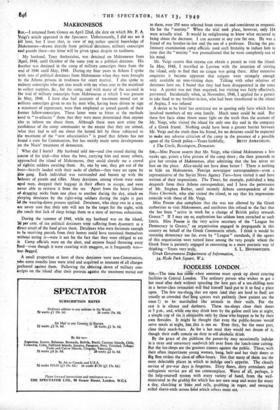MAKRONESOS Sts,—I returned from Greece on April 22nd, the date
on which Mr. F. A. Voigt's article appeared in the Spectator. Unfortunately, I did not see it later, but I trust that, in view of my rather special knowledge of akronesos—drawn directly from political detainees, military conscripts tend guards there—my letter will be given space despite its tardiness. j My husband, Tony .Ambatielou, was detained on Makronesos from , April, 1948, until October of the same year as a political detainee. His brother was detained in the camp of military conscripts there from the end of 1946 until May, 1948. During my four years in Athens I spoke With tens of political detainees from Makronesos when they were brought ,
lo the Athens prisons in readiness for court martial. I also spoke to Military conscripts who got into touch with me when sent to the mainland M collect supplies, &c., for the camp, and with many of the accused in Or trial of military conscripts from Makitnesos at which I was present An May, 1948. I have also had accounts of treatment meted out to military conscripts given to me by men who, having been driven to sign tt statement of repentance, were then employed as armed guards of their former fellow-conscripts. These latter were so bitter at the methods lined to " re-educate" them that they were more determined than anyone lase to inform me about them. Although these men now enjoy the v
, hat they had to tell me about the hatred felt by those subjected to onfidence of the camp commander to the extent that they are armed, he Weatment of the "new educationists" is proof that Athens has not found a cure for Communism, but has merely made some developments on the Nazis' treatment of democrats.
IWhat did I learn? My husband told me—and also stated during the course of his trial—that when the boat, carrying him and many others, 'approached the island of Makronesos, they could already see a crowd ■
of rightist soldiers awaiting them. As, one by one, they got• out of the boat—heavily loaded with their sacks of clothes—they were set upon by ghis gang. Each individual was surrounded and beaten up with the holsters of pistols and rifles. Many detainees, among whom were some eged men, dropped their luggage in their efforts to escape, and were never able to retrieve it from the sea. 'Apart from the heavy labour of-dragging nicks from one place to another during the day, attack on sleeping detainees by the right-wing soldiers during the night is part loi the wearing-down process applied. Detainees, who sleep two in a tent, are never sure that their tent will not be the target for the night, with the result that lack of sleep brings them to a state of nervous exhaustion.
During the minmer of 1948, while my husband was on the island, 1g per cent, of the political detainees wee suffering from dysentery as a erect result of the food given them. Detainees who were fortunate enough to be receiving parcels from their homes could have sustained themselves without eating it—were it not for the fact that they were obliged to eat in Camp officials were on the alert, and anyone found throwing away, 'food—even though it were crawling with maggots, as it frequently was— Was -flogged: A Small -proportion at least of these det*rees were. non-Communists, who Mine months later were tried and acquitted as innocent of all charges preferred against them. Following the „slinnting down of military con- !scripts on the island after their proteste agairilt the treatment meted out
,.• .
to them, over 150 were selected from them all'and considered as responsi- ble for the mutiny." When the trial took place, however, only 114 were actually tried. It would be enlightening to know what occurred to bring about the decrease. I can account at any rate for one. He was a friend of my brother-in-law and the son of a professor. During the pre- liminary examination camp officials used such brutality to induce him to state that the " mutiny " was premeditated that he went completely out of his mind.
Mr. Voigt asserts that anyone can obtain a permit to visit the island. In May, 1948, I travelled to Lavrion with the intention of visiting the island, only to find that no caique was going there. After extensive enquiries it became apparent that caiques were strangely enough only available on non-visiting days. Talking with other relatives of detainees later on, I found that they had been 'disappointed in the same way. A permit was not then required; but visiting was fairly effectively prevented. Incidentally when, in November, 1948, I applied for a permit to take food to my brother-in-law, who had been transferred to the island of,Aegina, I was refused
A desire to. be brief has restricted me to quoting only facts which have involved members of my own family. Much more could be said. But these few facts alone throw more light on- the truth than the account of Mr. Voigt, -who visited the island for only one day and in the company of a Greek friend. Nothing could have been a greater barrier between Mr. Voigt and the truth than his friend, for no detainee could be expected to make any adverse criticism of the camp in the presence of a possible






































 Previous page
Previous page